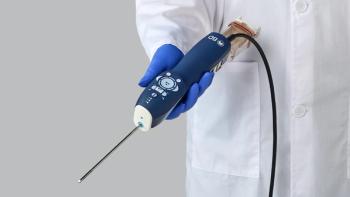
Offering an echogenic cutting cannula and enhanced sampling capability, the EnCor EnCompass Breast Biopsy and Tissue Removal System reportedly enables biopsy procedures across different breast imaging platforms.
Senior Editor, Diagnostic Imaging

Offering an echogenic cutting cannula and enhanced sampling capability, the EnCor EnCompass Breast Biopsy and Tissue Removal System reportedly enables biopsy procedures across different breast imaging platforms.
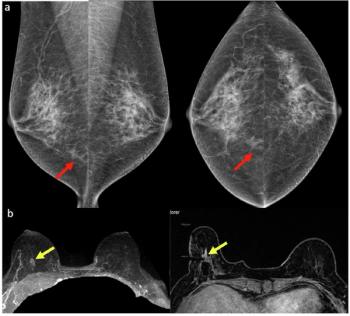
From satisfaction of search to grouped microcalcifications and challenges with isodense asymmetries and blind spots, the authors of a new review discuss contributing factors and preventive measures to avoid missed diagnoses of breast cancer in mammography interpretation.

In a recent interview, Rajesh Bhayana, M.D., discussed pertinent findings from a new study examining the use of the large language model GPT-4o in facilitating protocoling for abdominal and pelvic CT exams.
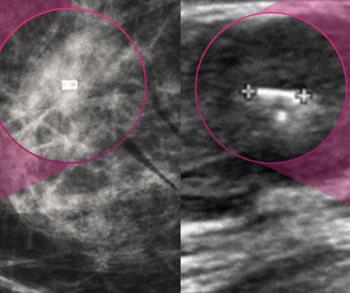
Offering a biocompatible, non-metallic alternative to metallic tumor markers, the VM1 tumor marker reportedly offers artifact-free visibility across a variety of breast imaging including mammography, ultrasound and MRI.
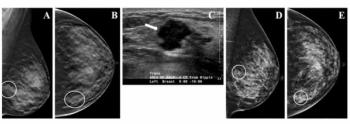
In what may be the largest study to assess digital breast tomosynthesis (DBT) screening of women with dense breasts, researchers noted only a 61.8 percent sensitivity for women with extremely dense breasts.
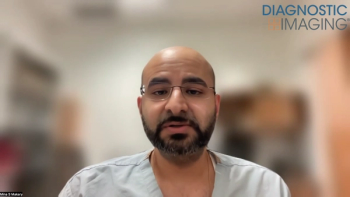
In a recent interview, Mina Makary, M.D., discussed recent research examining diversity within interventional radiology (IR), attrition rates in IR residency programs and potential strategies to bolster recruitment and retention.
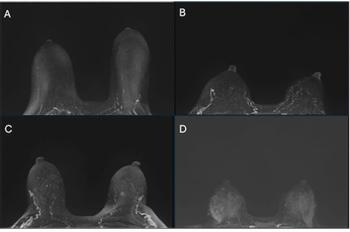
After a causal mediation analysis that adjusted for breast density, researchers found that Black women had a significantly higher likelihood of high MRI-derived background parenchymal enhancement (BPE) than White women in a study involving nearly 2,500 women.

Offering compact versatility for an array of clinical settings, the ASUS Handheld Ultrasound LU800 is reportedly the first handheld device to be supported across Android, Chrome, iOS and Windows operating systems.

In a recent interview, Ron Blankstein, M.D., discussed insights from a recent consensus statement from the American College of Cardiology on AI-enabled plaque quantification with coronary computed tomography angiography (CCTA) exams, and other pertinent considerations with the emerging technology.
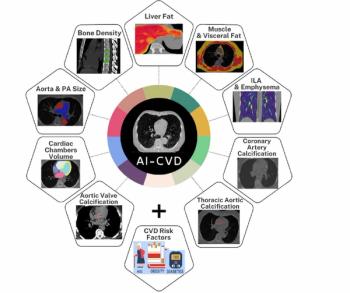
The AI-CVD software reportedly combines automated quantitative measurements for cardiovascular assessments such as coronary artery calcium (CAC) scoring and epicardial fat volumetry with lung attenuation and liver attenuation analysis in one CT-based AI platform.

Catch up on the top radiology content of the past week.
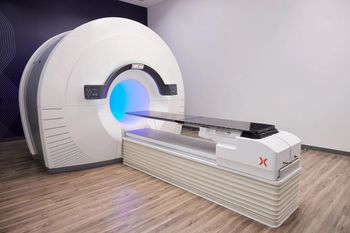
The upgraded RefleXion X2 platform offers a 20 cm field of view that may bolster visualization of moving tumors.
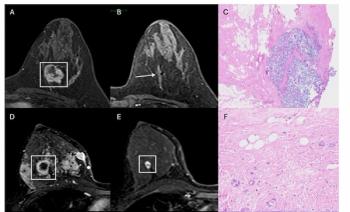
For patients with triple-negative breast cancer being treated with neoadjuvant chemotherapy and immunotherapy, MRI demonstrated a 94.3 percent sensitivity for predicting pathologic complete response, according to a new study.
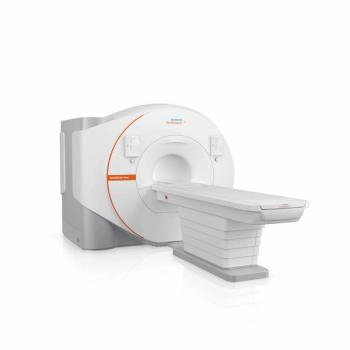
In addition to offering a variety of AI features, the Magnetom Flow 1.5T MRI system reportedly facilitates a 56 percent reduction in annual energy consumption in comparison to previous MRI scanners.
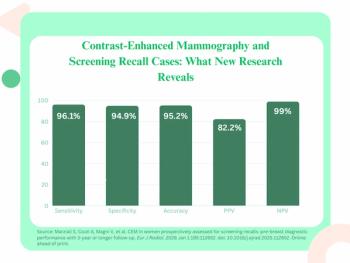
The use of contrast-enhanced mammography in nearly 200 cases of screening recalls yielded a 96.1 percent per-breast sensitivity rate and a 99 percent negative predictive value.

In a recent interview, Onofrio Catalano, M.D., Ph.D., discussed new research findings demonstrating robust sensitivity and specificity in detecting hepatocellular carcinoma in patients with LI-RADS 3 presentations.
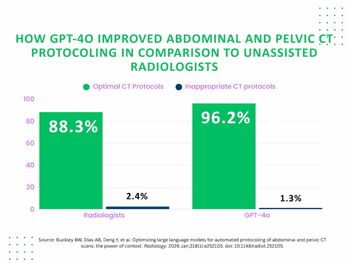
In a study involving over 1,400 patients who had abdominal or pelvic CTs, the large language model GPT-4o selected optimal protocols in 96.2 percent of cases in comparison to 88.3 percent for radiologists.
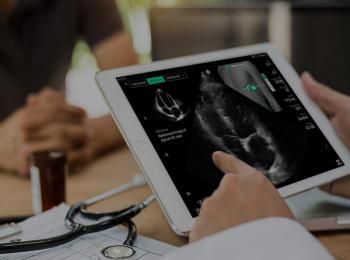
The Echo Stewardship Program, which allows non-sonographer clinicians to perform focused cardiac ultrasound exams under physician guidance, is now cleared for use across handheld, laptop and cart-based ultrasound platforms

In a recent interview, Jeremie Calais, M.D., Ph.D., discussed new research examining the prognostic capacity of PSMA PET parameters in predicting hematologic toxicity and outcomes for patients treated with (177Lu)Lu-PSMA-617 for mCRPC.

In a new literature review, researchers discuss common patterns and complications with cosmetic fillers that can be revealed on ultrasound imaging.
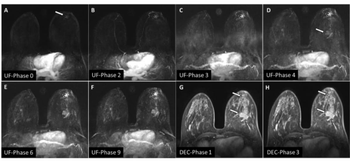
Employing a 77-second scan time for obtaining ultrafast breast MRI views, researchers found a 92.1 percent AUC for differentiating between benign and malignant lesions, according to new prospective study.

In a recent interview, Michael Hofman, MBBS, FRACP, discussed preliminary research findings and the potential utility of the positron emission tomography (PET) agent ITM-94, which recently garnered a fast track designation from the FDA for clear cell renal cell carcinoma (ccRCC).
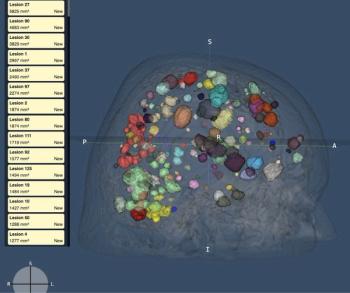
The cloud-based Brain Mets software reportedly provides accelerated detection, measurement and tracking of metastatic brain lesions based on routine brain MRI sequences.
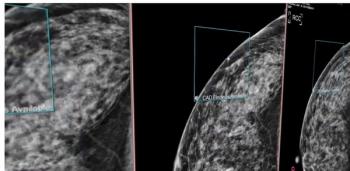
In addition to advanced mammography image processing and integrated MQSA tracking, the MammoIQ system enables viewing of adjunctive modalities including MRI, ultrasound and PET imaging.

Catch up on the top radiology content of the past week.
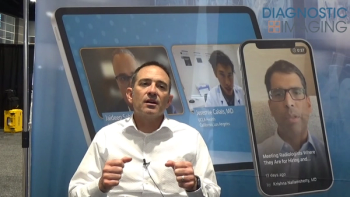
In an interview at the recent RSNA conference, Chris Davis, DMSc, PA-C, RT, discussed key considerations with the integration of advanced practice providers (APPs) into radiology.
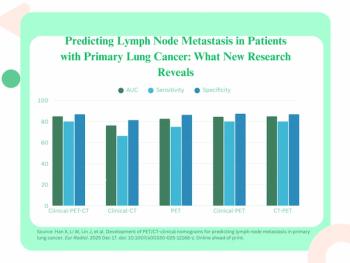
For patients with primary lung cancer, a nomogram incorporating PET, CT and clinical findings offered an 87.7 percent AUC for predicting lymph node metastasis and over a 19 percent higher sensitivity than a PET-based model for predicting small lymph node ( > 1 cm) metastasis.
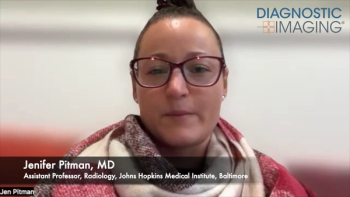
In a reeent interview, Jenifer Pitman, M.D., discussed key findings from a large knee MRI study, presented at the RSNA conference, which demonstrated significant gender differences with ACL, MCL and medial meniscal injuries.
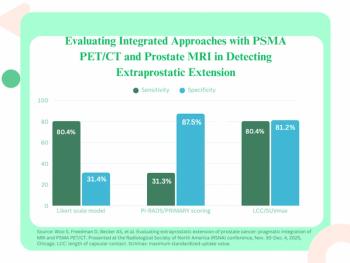
In a comparative study presented at the recent RSNA conference, researchers found that the combination of capsular contact length from MRI and SUVmax data from PSMA PET/CT yielded greater than 80 percent sensitivity and specificity for extraprostatic extension.
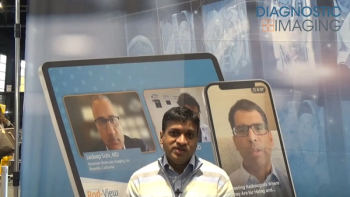
In an interview at the recent RSNA conference, Sriyesh Krishnan, M.D., discussed pertinent principles in assessing AI models, ongoing monitoring of the adjunctive value and an unyielding focus on patient care.